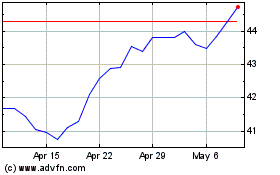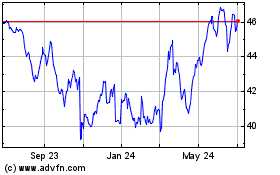Investors in highly valued e-cigarette maker undeterred by risks
of regulation
By Juliet Chung
This article is being republished as part of our daily
reproduction of WSJ.com articles that also appeared in the U.S.
print edition of The Wall Street Journal (December 14, 2018).
Several large investment firms are sitting on windfalls from
e-cigarette maker Juul Labs Inc. -- and plan to continue backing
the controversial startup despite the risk of increased
regulation.
Tiger Global Management LLC, Darsana Capital Partners LP, D1
Capital Partners LP, Marianas Fund Management LLC and Coatue
Management LLC have invested in Juul at various points over the
last two years. Juul has rapidly appreciated in value, rising to a
roughly $16 billion valuation last summer.
A possible deal to sell a significant minority stake to Altria
Group Inc., first reported by The Wall Street Journal, could value
Juul at more than $30 billion, said people familiar with the
matter. Coatue has approached its clients about investing in Juul
at a roughly $30 billion valuation should the Altria deal fall
through. A valuation above $30 billion would make Juul one of the
world's most valuable startups, a remarkable ascent even by the
fast pace of Silicon Valley.
The firms' bets on Juul -- described by more than a dozen people
familiar with the investments -- hold both regulatory and
reputational risks given e-cigarettes' use among youth. Some
hedge-fund clients have privately expressed discomfort with the
investment or opted out of having their money in Juul.
Other investors, including Viking Global Investors LP; Willett
Advisors LLC, the family office of former New York City Mayor
Michael Bloomberg; and Valiant Capital Management LP, have
considered investing in Juul but passed for reasons including
unease about its popularity among underage users, other people
said.
The funds backing Juul are betting it can disrupt the $600
billion cigarette industry with its thumb drive-shaped vaporizer
that delivers a powerful dose of nicotine from liquid-filled pods
it also sells. Smokers want to quit, investors say, and Juul's
vaping device offers the most satisfying alternative. Its business
model is also attractive because its liquid nicotine enjoys higher
margins than traditional cigarettes, which are subject to high
taxes, but are still addictive.
Critics argue Juul, the dominant e-cigarette maker, is creating
a new generation of nicotine addicts by introducing underage users
to vaping. The company and its backers say the e-cigarettes are
meant to help adult cigarette smokers switch to a less-harmful
alternative.
One of the biggest winners on paper is $29 billion Tiger Global,
which has been an early mover among hedge-fund firms into private
investments. Tiger Global invested through its venture business in
early 2017, when Juul was a product of vaping startup Pax Labs. The
deal valued Pax around $300 million largely on the basis of Juul
and was a way for Tiger Global to bet on Juul.
Tiger Global more recently led a fundraising round for Juul in
July, when it invested $600 million.
New York stockpicking hedge funds D1 and Darsana also invested
in July. The $5 billion D1, which started trading earlier this year
as one of the biggest hedge fund launches in years, has also bet
against tobacco stocks.
Marianas bought a stake in Pax when it was valued around $300
million. Marianas founder Will Snellings at one point described the
wager to a potential investor as perhaps his greatest deal.
Mr. Snellings closed his hedge fund in 2017 but continues to
manage a special-purpose vehicle holding Juul. Some of the
investors who opted into the vehicle have been selling shares in it
on the secondary market in recent months, buyers said.
But regulation remains a risk for investors.
The Food and Drug Administration launched a probe of Juul in
April, requesting information that could help explain why its
products appeal to minors. FDA Commissioner Scott Gottlieb said in
September he was considering a ban on flavored e-cigarettes,
declaring teen use an "epidemic." Federal data released in November
showed a 78% jump in 2018 over the previous year in e-cigarette use
among high-school students.
Juul said in November it would stop selling most of its flavored
products at brick-and-mortar stores and shut down some social-media
accounts, shortly before the FDA said it would restrict flavored
e-cigarette sales. A company spokesman on Wednesday referred to a
previous statement by CEO Kevin Burns: "Our intent was never to
have youth use Juul products. But intent is not enough, the numbers
are what matter, and the numbers tell us underage use of
e-cigarette products is a problem. We must solve it."
Some investors said they hope Juul's actions will reduce youth
vaping to a point where an FDA ban on e-cigarettes altogether will
be unlikely. And while Juul has run into regulatory hurdles in
Israel, investors expect significant growth overseas even if the
company grows more slowly in the U.S.
Some hedge funds internally debated the investment given Juul's
popularity among youth and quizzed the company about its plans to
police sales before investing.
Wealthy individuals and families are also among Juul's
investors, including hedge-fund billionaire Stanley Druckenmiller
and Nicholas Pritzker, a Juul director.
Some institutions have found themselves in awkward
positions.
San Francisco philanthropy Good Ventures, started by Facebook
Inc. co-founder Dustin Moskowitz and his wife, philanthropist and
former reporter Cari Tuna, opted out of investing in Juul through
Darsana. Good Venture's mission is "to help humanity thrive,"
according to its website. Darsana gave its clients a choice about
whether to invest in the company after learning several were
uncomfortable backing it.
But Good Ventures is invested in Juul through Tiger Global,
which uses committed capital to make private investments. "Good
Ventures seeks to avoid committing to funds likely to make
investments in industries that conflict with its mission," Michael
Levine, a spokesman for Good Ventures, said in a statement.
Write to Juliet Chung at juliet.chung@wsj.com
(END) Dow Jones Newswires
December 14, 2018 02:47 ET (07:47 GMT)
Copyright (c) 2018 Dow Jones & Company, Inc.
Altria (NYSE:MO)
Historical Stock Chart
From Mar 2024 to Apr 2024

Altria (NYSE:MO)
Historical Stock Chart
From Apr 2023 to Apr 2024
